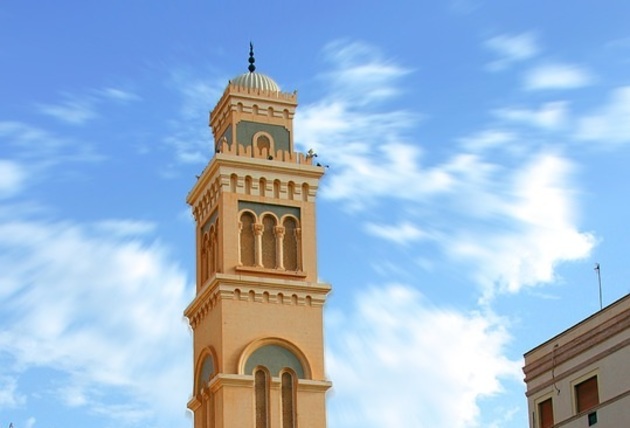As controversy over the upcoming Libyan elections threatens to rekindle clashes between warring factions, the strategy Turkey will follow in the run-up to the vote will be of greater significance, Al-Monitor writes.
Libyan Prime Minister Abdul Hamid Dbeibah announced his presidential bid on Nov. 21 for the Dec. 24 presidential election, joining other contenders including former eastern-based commander Khalifa Hifter, Saadi Gadhafi, a son of the late Libyan leader Moammar Gadhafi, and Aguila Saleh, speaker of the House of Representatives.
Hifter's and Gadhafi’s bids have outraged militia groups based in strongholds of his opponents including Tripoli, Misrata, and Zintan. Turkish-backed political actors have also been disgruntled by the candidacy of Hifter.
Prior to the two heavyweights’ jump into the presidential race, Turkish President Recep Tayyip Erdogan separately hosted Dbeibah and Khalid al-Mishri, head of the High Council of State, in Turkey in early November in a bid to plot an election strategy. During his visit to Turkey in early November, Mishri, who is also a Muslim Brotherhood leader, lamented a new election law paving the way for Hifter and Gadhafi’s involvement in the race. Mishri said the law was passed by the country's Tobruk-based House of Representatives without coordination of the High Council of State and the Tripoli-based government. Describing the bill as “illegal,” Mishri argued that Dbeibah could easily win the elections under fair rules. He also hinted that they would reject the election results should Hifter win.
“Turkey and Italy do not favor and do not support an erroneous election in Libya. Because they think that an election made with faulty laws will cause the country to be divided, dragged into a new war, and they support us in this regard,” he said in Istanbul Nov. 13. He also criticized France, Egypt and the US’s positions on the election. Speaking like Turkey’s lawyer, Mishri also backed the two critical aspects of Ankara's Libya policy. He said Turkey’s military presence is fully in line with international law and that Ankara was defending its rights in the eastern Mediterranean through a maritime deal it made with the Tripoli-based government. Turkish-backed groups’ main problem with the new law is that lacks a provision to prevent Hifter or Gaddafi’s candidacy, while it contains a provision that prevents Dbeibah from running. Although Dbeibah registered himself as a candidate, it remains unclear whether his candidacy would be accepted by the High Election Committee. According to a United Nations-mediated road map, the interim leaders including Dbeibah, pledged not to take part in the coming elections. Yet, the new law which was passed by the Tobruk-based House of Representatives on Sept. 8 left this condition out, paving the way for the Prime Minister’s candidacy.
Yet, the new law also stipulates that all public and military officials must resign from their office three month ahead of the elections. Both Saleh and Hifter had resigned from their posts in September, but Dbeibah has not. Opponents of the law argue that the bill needs to be amended to allow candidates to hold their positions until they officially submit their candidacy. Dbeibah argued that the law was “flawed” and written to serve Hifter and Saleh. The election law allows both Hifter and Saleh to reassume their posts after the elections.
Ankara has two possible candidates to support: Dbeibah and former Interior Minister Fathi Bashagha. After the failure of Dbeibah's efforts to secure some advance support from the electoral committee, the former businessman formally submitted his candidacy on Nov. 21, a day before the deadline. Dbeibah supporters, who are now waiting for the committee's decision, might try to postpone the elections for three months if his bid is rejected.
Bashagha, who hails from Misrata — a stronghold of Turkish-backed groups — had also worked closely with Ankara to break the Hifter-led eastern forces’ siege of Tripoli last year. Bashagha sought Egypt and France’s support for his bid for premiership after the cease-fire, but lost to Dbeibah during the UN-sponsored vote on new interim authorities in February. Bashagha, who registered himself as a presidential candidate on Nov. 17, is the second alternative whom Ankara might back. Some believe that the US also supports Bashagha, who travelled to Washington during the Tripoli siege and was able to change Washington’s position on the Libyan war by underlining the increasing influence of Russia in the country.
Gaddafi’s candidacy, meanwhile, might fit Ankara’s pragmatism as it could fracture Hifter’s votes. Although a Libyan court exonerated Gaddafi from embezzlement and murder charges in 2018, he is still wanted by the International Criminal Court for war crimes. Yet rejection of Hifter’s candidacy seems highly unlikely, as it would derail the elections in the east, possibly leading to a permanent division between country's east and west.
The US administration, which has openly opposed Gaddafi's candidacy, is keeping mum on Hifter’s presidential bid. A victory by Hifter, who had the support of Russia, France, Egypt and the United Arab Emirates during the civil war, could complicate Turkey's position.
If his candidacy is approved, Dbeibah is widely considered a frontrunner. According to al-Arab newspaper, Dbeibah, who is widely considered the best chance to beat Hifter and Gaddafi, is working in coordination with the High Council of State, militia leaders and other social groups. He has also secured the support of Misrata-based influential groups and political Islamists. Meanwhile, Egypt, which supported Hifter-led forces against Turkish-backed groups, avoids openly favoring a candidate. According to Egyptian commentator Mohamed Abul-Fadl, Cairo maintains good relationships with most candidates, including Dbeibah, despite his close ties with Turkey, and is avoiding an interventionist image when all bets are open.






